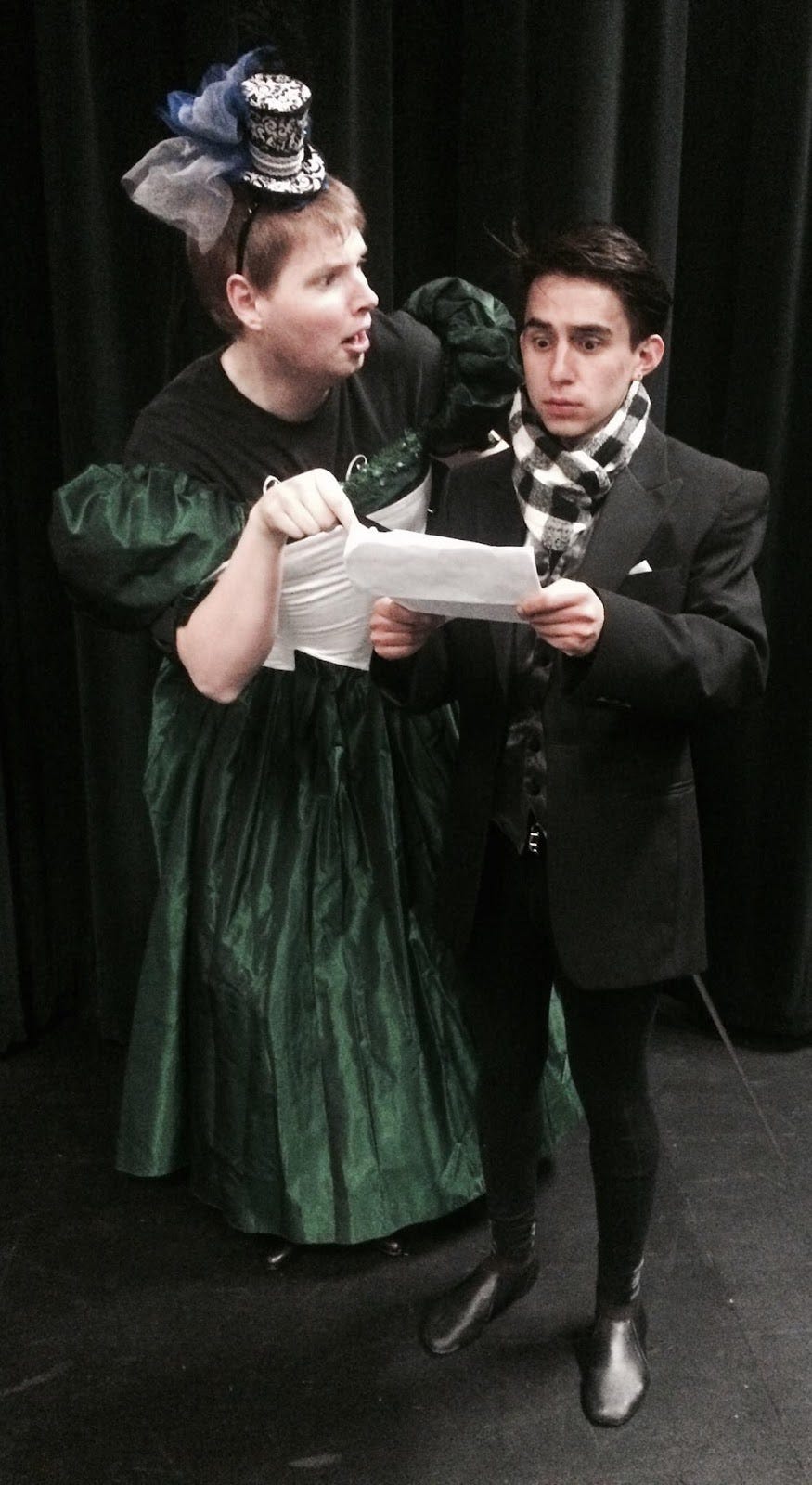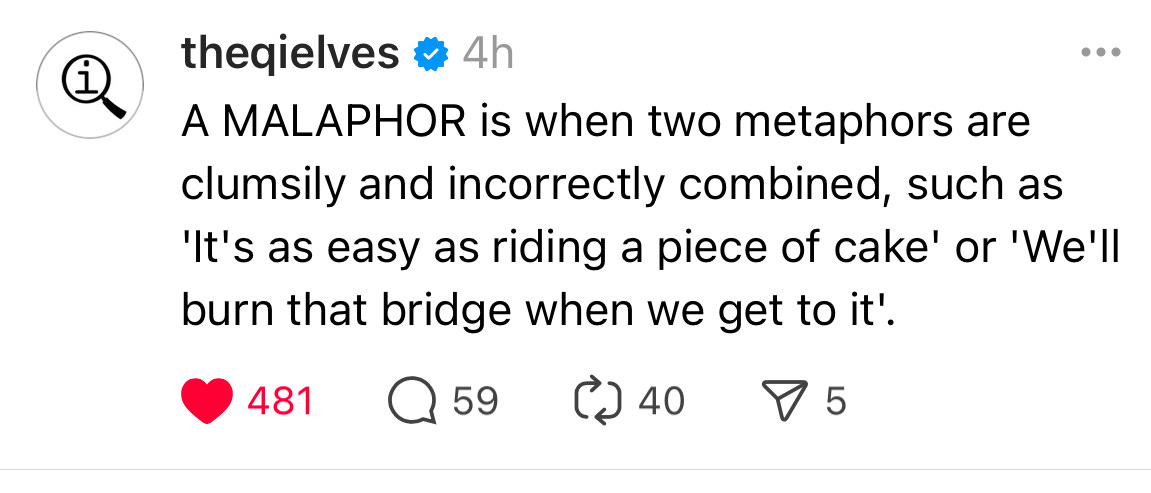Malapropism
I know this isn’t the same word and doesn’t mean the same thing but I have to include it here, because it reminds me of one of the best roles I’ve ever played that I actually haven’t played. I’ll explain:
Mrs. Malaprop in Richard Brinsley Sheridan’s The Rivals is one of the funniest, most difficult roles in oldey-timey comedy, and it’s mainly because of the characteristic that gives her her name. Know that old saw: ‘Dying is easy; comedy is hard’? This saying illustrates the common knowledge among actors (and I think among writers too), that tragedy is way way easier than comedy, when it comes to executing it well. What I learned in my vasty education and experience in the matter is simply this: when you’re acting in a tragedy, all you have to do is feel, deeply. And, as most modern acting training is focused on internal work, that’s much easier for most actors to handle. In a comedy? You don’t need to feel, you need to think. Think fast, and intricately. And speak so, too. Mrs. Malaprop as a character is one example of this truth.
I played her in Acting school, so I did in fact play her, but only in one scene, in class. I’d love to play her in a full production (and now I’ve aged into the role, so it’s a lot more possible). The challenge of Mrs. Malaprop is in her lines: she loves to use big words to show off her ‘learnin,’ but all her big words are the wrong big words. So the challenge is to know what she wants to say—in other words, what other big word does she intend, when she uses the wrong one? and then act accordingly. It’s exhilarating and so funny, still, even though the play was first produced in England in 1742.
I always taught The Rivals for our period movement unit in Stage Movement class. See, kids who grow up in T-shirts and jeans don’t have any knowledge of how to move in corsets and breeches, nor indeed what difference there was in personal space, in movement speed, in how to sit and stand, and the more elaborate traditions of gendered bows and fan code. So we took a full 2-3 weeks just learning how to move like people in the mid-1700s. The scenes in Movement class are somewhat secondary, but of course the old-fashioned and intricate lines are entwined with how the characters move. And there would always be one ambitious young person who’d attempt Mrs. Malaprop.
You may have heard the term malapropism already, if not the character. The term came first, and the character was named for this habit of hers, I think? Or did the term get coined because of her name? But most characters in Restoration comedies are named broadly for their attributes, like: Lydia Languish, Anthony Absolute, Lucius O’Trigger*, and Bob Acres the country bumpkin. So Malaprop makes sense. Can you decipher this speech of hers? How would you deliver it? Do you ‘reprehend the true meaning of what she is saying’?
Mrs. Malaprop: I would by no means wish a daughter of mine to be a progeny of learning; I don't think so much learning becomes a young woman; for instance, I would never let her meddle with Greek, or Hebrew, or algebra, or simony, or fluxions, or paradoxes, or such inflammatory branches of learning—neither would it be necessary for her to handle any of your mathematical, astronomical, diabolical instruments.—But, Sir Anthony, I would send her, at nine years old, to a boarding-school, in order to learn a little ingenuity and artifice. Then, sir, she should have a supercilious knowledge in accounts;—and as she grew up, I would have her instructed in geometry, that she might know something of the contagious countries;—but above all, Sir Anthony, she should be mistress of orthodoxy, that she might not mis-spell, and mis-pronounce words so shamefully as girls usually do; and likewise that she might reprehend the true meaning of what she is saying.
*Lucius O’Trigger is a drunken Irishman who is prone to starting fights. So like, some cultural stereotypes really do go way back, don’t they? I imagine him costumed like the Notre Dame Fighting Irish mascot.

But a malapropism is not a malaphor!
Malaphors are also a lot of fun to play with—it’s like memes in a way; twisting and playing with metaphors to make surreal jokes out of them. The ones in the QI example above are great, and the bridge one is obviously well-used; I think that malaphor version is just as widely used as the original metaphor, at least it is in my circles.
What are some fun malaphors that I’m fond of (or have made up)? You know, it’s actually a little harder to come up with a good malaphoric zinger than you might think. It’s a pretty fun challenge.
you can beat a dead horse to water but you can’t make it drink
piece of pie / easy as cake (wasn’t this mismatched malaphor made popular by some dialogue in sci fi film classic 2010? Am I remembering that right?)
I can read him like the back of my book
I want to hear your favorites, or have you make your own! Do this for me in the comments, yeah?





If the shoe fits, you made your bed. There are also these twists, not quite malaphors: If the shoe fits, throw it at 'em.
The early bird should be shot for waking me up.
A penny saved is useless, so are nickels.
Now some senseless malaphors:
Haste makes a dollar foolish.
Early to bed get the worms.